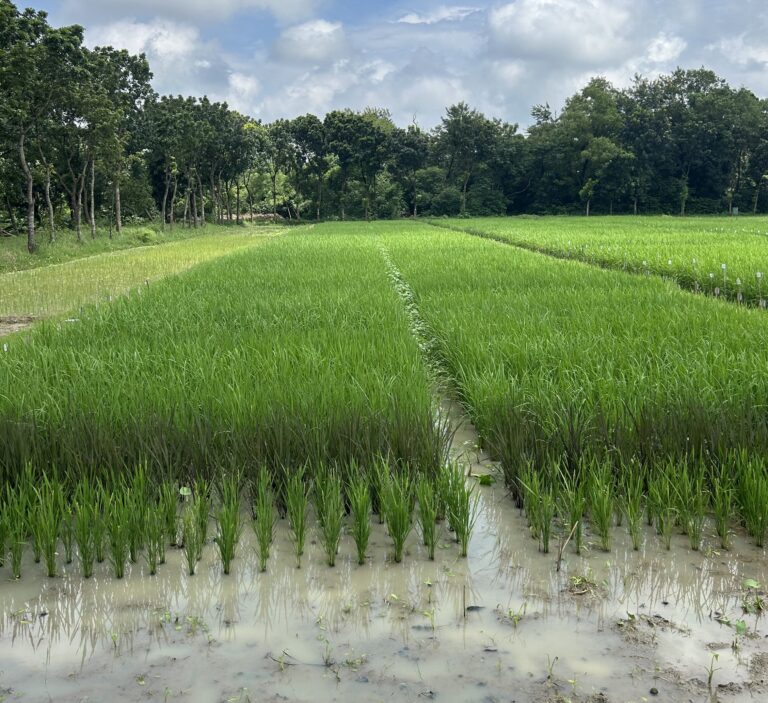Project Description
Agriculture is a crucial source of greenhouse gas (GHG) emissions, but also shows a large potential to capture and store atmospheric carbon to mitigate climate change (Paustian et al., 2016). Beside these factors, agriculture is crucial for food security and a critical economic factor, especially in highly populated agriculturally focused regions like South-Asia. Climate change, increasing population and environmental changes will put intense pressure on the agricultural sector and will require adaptation and mitigation. This project will analyse potential solutions for crop production systems in South-Asia. The project is design as multi-scale approach starting with study sites in Bangladesh, continue with simulations on the national scale and includes an extrapolation to the wider region in South-Asia. The focus will be on wheat and rice. Rice contributes 10% to global methane emissions and is one of the priority crops for GHG emission reductions. Wheat is included, as it is often used in rotation with rice, with land-use solutions needing to target the entire ecosystem. The focus on Bangladesh enables a detailed case study on the national scale, which is mainly the target scale for climate mitigation strategies. Bangladesh is of special interest as 60 % of the national crop production system was rice in 2021 and the rice production systems are strongly affected by climate change impacts, water scarcity and quality (due to salination). The complexity and interaction of carbon and nitrogen dynamics make it difficult to develop solutions or test impacts of available options in field experiments. Therefore, this study will use model approaches, using the biogeochemical models DAYCENT and ECOSSE to simulate rice production systems for the listed target processes, which will be the basis for developing solutions to improve the growing systems and make them more sustainable. Data from study sites (Begum et al., 2019) and spatial data (Begum et al., 2018) are already available. Climate change data and salinity experiments will be used for simulations to analyse the impacts. Different mitigation options (changes in tillage and water management, and organic fertilizer applications) will be tested for impacts on yield and GHG emissions. The overall objectives will be an analysis of a catalogue of solutions for sustainable agriculture to 1.) reduce greenhouse gas emissions, 2.) maintain or increase agricultural productivity, 3.) to reduce contamination of the rice, 4.) improve the soil health and 5.) sustainable use of the resources.
Initially, the project will start with data collation and preparation, starting with the study sites and later with spatial data sets. The initial data need to be extended to improve the data basis for calibration and evaluation of the two models. A salinity module for the models will be used to simulate salt-stressed rice production including salt tolerant rice varieties. The spatial simulations will up-scale the findings to the country scale and beyond to the wider scale in Southern-Asia to detect the variability and transferability of different solutions and their impacts on the ecosystem. This will enable the indication of region-specific suggestions to improve the agricultural system.
CANDIDATE BACKGROUND
The candidate should have a background in environmental science, geoecology, biology, biogeochemistry, geography, agriculture or comparable fields. As the focus is on biogeochemical processes in the pedosphere, biosphere and hydrosphere some deeper understanding of the interactions of processes in these environments would be useful. There is no requirement for programming skills, but some experience in a computer language (e.g. R, MATLAB, or FORTRAN) would be beneficial. The candidate will handle and analyse large amounts of data, therefore, skills and experience in data analysis and data organisation would be desirable.
It will be expected that the successful candidate is fluent in English language (reading, writing, and speaking) and is able to present research results (oral and poster presentations).
Photo credit: Gareth Norton
Supervisors
Primary Supervisor: |
University of Aberdeen, School of Biological Sciences Email: Matthias.kuhnert@abdn.ac.uk |
Paul N. WilliamsSecondary Supervisor: | Profile: Paul N. Williams Email: p.williams@qub.ac.uk Institution: Queen's University, Belfast Department/School: School of Biological Sciences |
Gareth NortonAdditional Supervisor: | Profile: Gareth Norton Email: g.norton@abdn.ac.uk Institution: University of Aberdeen Department/School: School of Biological Sciences |
References
Begum, K.; Kuhnert, M.; Yeluripati, J. B.; Ogle, S.; Parton, W.J.; Williams, S.A.; Pan, G.; Cheng, K.; Ali, M.A.; Smith, P. (2019). Modelling greenhouse gas emissions and mitigation potentials in fertilized paddy rice fields in Bangladesh. Geoderma 341, 206-215
Begum, K.; Kuhnert, M.; Yeluripati, Y.; Ogle, S.; Parton, W. Kader, M.A.; Smith, P. (2018). Model based regional estimates of soil organic carbon sequestration and greenhouse gas mitigation potentials from rice croplands in Bangladesh. Land, 7(3) pp. 82-99
Paustian, K., Lehmann, J., Ogle, S., Reay, D., Robertson, G.P. & Smith, P. 2016, “Climate-smart soils”, Nature, vol. 532, no. 7597, pp. 49-57.
QUADRAT Themes
- environmental-management






















































